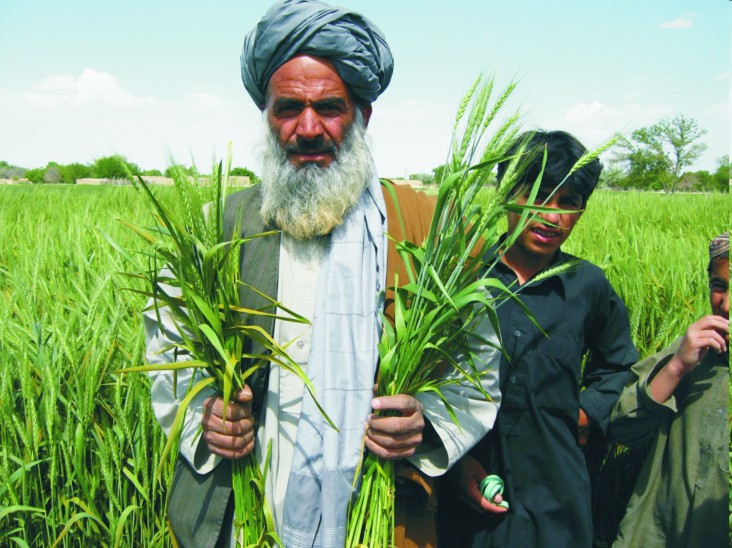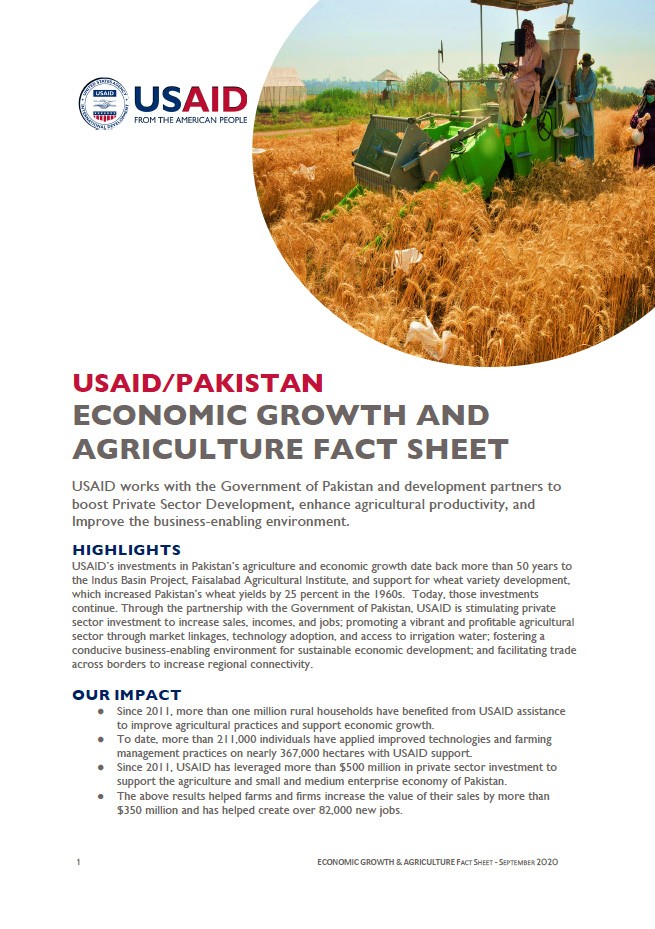Speeches Shim

The United States Agency for International Development (USAID) works with the Government of Pakistan and development partners to boost private sector development, enhance agricultural productivity, and improve trade and the business-enabling environment.
HIGHLIGHT
Through its partnership with the Government of Pakistan, USAID is stimulating private sector investment to increase sales, incomes, and jobs; promoting a vibrant and profitable agricultural sector through market linkages, technology adoption, and access to irrigation water; fostering a business-enabling environment for sustainable economic development; and facilitating trade across borders to increase regional connectivity.
OUR IMPACT
- More than one million rural households have benefited from USAID investments in improving agricultural practices and supporting economic growth.
- Leveraged more than $500 million in private sector investment to support agriculture and small- and medium-enterprises (SMEs).
- Helped farms and firms increase the value of their sales by more than $350 million and create over 82,000 new jobs.
BOOSTING PRIVATE SECTOR DEVELOPMENT
USAID is helping businesses to expand by increasing access to improved technologies, management practices, and finance. USAID builds business-to-business linkages to help access new markets, improves business operations, and facilitates regional trade. USAID assistance is fostering entrepreneurship and job creation by working with SMEs to improve business practices, build networks/linkages, inform policy reforms to improve the business enabling environment, and increase access to capital. USAID projects also directly support Pakistan to improve its ranking with the World Bank’s Ease of Doing Business rankings; in the 2020 report, the country improved its ranking by 28 spots – from 136 to 108. In addition, since financing remains a challenge for young entrepreneurs, USAID is partnering with banks to encourage financing to SMEs through a loan-guarantee scheme, which has helped expand bank lending to SMEs by more than $46 million.
ENHANCING AGRICULTURE PRODUCTIVITY
USAID’s investments in Pakistan’s agriculture and economic growth date back more than 50 years to the Indus Basin Project, Faisalabad Agricultural Institute, and support for wheat variety development, which increased Pakistan’s wheat yields by 25 percent in the 1960s. Today, those investments continue. Pakistan’s agriculture sector employs more than 40 percent of the nation’s workforce and is a key driver of the country’s economic growth. USAID has been working with Pakistan to boost agricultural productivity by developing new crop varieties, improving management practices, and increasing farmers’ access to improved technologies and irrigation water. In 2019, with USAID support, Pakistan introduced 20 new high-yielding and disease-resistant varieties of wheat and maize. As a result, more than 211,000 individuals have applied improved technologies and farming management practices on nearly 367,000 hectares. In addition, USAID constructed 420 km of irrigation canals, providing access to irrigation water to nearly 8,000 farming households in the newly-merged districts of Khyber Pakhtunkhwa. To further increase farmers’ and agribusinesses’ incomes, USAID helps agricultural SMEs access financing and add value to agricultural commodities and produce, and links them to more lucrative markets.
IMPROVING THE BUSINESS-ENABLING ENVIRONMENT
USAID partners with the Government of Pakistan to support economic policy reforms that make doing business easier. In particular, USAID is providing assistance to the Government of Pakistan to modernize trade systems and adopt global trade norms, including the rationalization of duties, the streamlining of processes, and the implementation of international trade agreements and conventions. By taking these steps, the Government of Pakistan will reduce compliance costs for businesses seeking to conduct trade.
USAID is working with the Government of Pakistan to establish a National Single Window and e-Payment system for customs and cargo clearance. This will streamline Pakistan’s trade and customs procedures by creating a one-stop shop for companies seeking to do business. USAID helped design a new regulatory scheme for the licensing and operation of a warehouse receipts system for selected agricultural commodities. Additionally, USAID has helped the Government of Pakistan to revise its SME Policy. The revised SME Policy has been designed to create an enabling environment for SMEs that triggers private sector growth, generates employment, improves business competitiveness, and increases exports. The improved Ease of Doing Business ranking indicates these efforts have paid off.



Comment
Make a general inquiry or suggest an improvement.